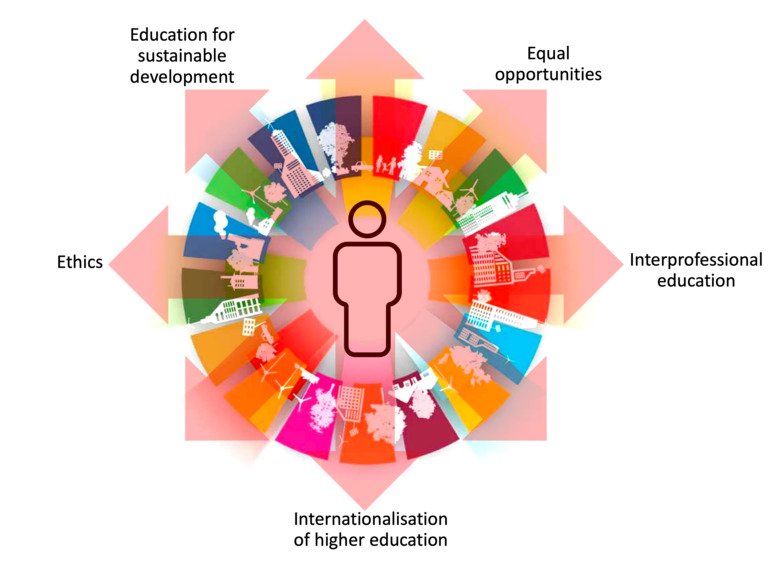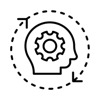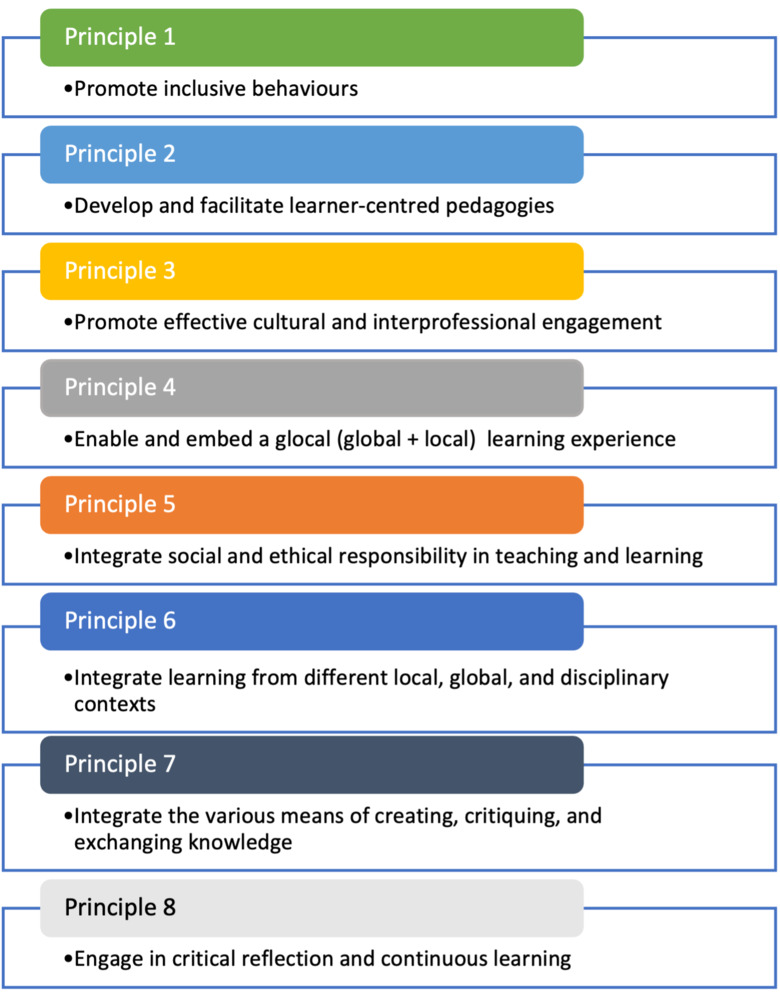Principles for quality education
Are you looking for ways to integrate Agenda 2030 into a course? Are you looking for support in upgrading or designing a curriculum fit for Agenda 2030? We have put together eight principles for quality education through the lens of Agenda 2030 to support you. Find out more on this page!

Context
To face the challenges of globalisation and the accelerating changes in the environment, society, technology and healthcare , KI students need to be empowered and feel that they can aspire to help shape a world where well-being and sustainability - for themselves, for others, and for the planet - is achievable.
Many of these challenges are also opportunities for human advancement, and our students and educators must be equipped to handle them through high quality and appropriately designed education.
Increasingly multicultural - and hence multilingual - societies have an impact on higher education and student achievement. KI must therefore also seek to harness the benefits the students and educators from diverse backgrounds bring to our learning spaces.
The Board of Higher Education and the Board of Doctoral Education have asked the Unit for Teaching and Learning to create a process to facilitate course design and curriculum design for all KI staff.
KI Strategy 2030 is our roadmap for education
KI Strategy 2030 highlights five core educational areas to develop further, they are: ethics, equal opportunities, international education, interprofessional education, and education for sustainable development.

Four out of five of KI Strategy 2030’s overarching objectives are dedicated to these specific educational areas:
- An ethical approach, academic freedom, critical reflection, high quality, and high ambitions shall pervade and support everything we do.
- A deep global, national, and local commitment to human health shall characterise our education and research.
- A richness of perspectives shall define our education and research. Education and research shall be tightly coupled and synergies explored.
- Interprofessional learning, lifelong learning, and internationalisation shall characterise our educational activities.
Concepts
In order to find interlinkages and overlaps between the five core educational areas, we turned to definitions and conceptual frameworks provided by KI experts in ethics, equal opportunities, international education, interprofessional education, and the Sustainable Development Goals.

Equal opportunities
Providing equal opportunities in education concerns both inclusive and accessible education:
Inclusive learning and teaching in higher education refers to the ways in which pedagogy, curricula and assessment are designed and delivered to engage students in learning that is meaningful, relevant and accessible to all. It embraces a view of the individual and individual difference as the source of diversity that can enrich the lives and learning of others (Hockings: 2010).
Accessible education is the process of designing courses and developing a teaching style to meet the needs of people from a variety of backgrounds, abilities and learning styles. Just as there is no single way to teach, people learn in a variety of ways; using different instructional methods will help meet the needs of the greatest number of learners. (Nilson: 2010)

Interprofessional Education (IPE)
Occasions when members or students of two or more professions learn with, from and about each other to improve collaboration and the quality of care and services (CAIPE, 2016).

Internationalisation of Higher Education (IHE)
The intentional process of integrating an international, intercultural or global dimension into the purpose, functions and delivery of post-secondary education, in order to enhance the quality of education and research for all students and staff, and to make a meaningful contribution to society (De Wit et al. 2015).

Ethics
Integrating ethics into education includes both medical and research ethics:
- Medical ethics is a system of moral principles that apply values and judgement to the practice of medicine (Markose et al.,2016).
- Research ethics are the set of ethical guidelines for conducting and disseminating scientific research responsibly, and governs the standards of conduct for scientific researchers (Faden et al., 2013).

Education for Sustainable Development (ESD)
ESD gives learners of all ages the knowledge, skills, values and agency to address interconnected global challenges including climate change, loss of biodiversity, unsustainable use of resources, and inequality. It empowers learners of all ages to make informed decisions and take individual and collective action to change society and care for the planet.
ESD is a lifelong learning process and an integral part of quality education. It enhances the cognitive, socio-emotional and behavioural dimensions of learning and encompasses learning content and outcomes, pedagogy and the learning environment itself (UNESCO, 2022).
Eight principles for quality teaching and learning

In an effort to spare you from the competing demands of different educational agendas on your time, the potential overlaps and interlinkages between equal opportunities, ethics, international education, interprofessional education and education for sustainable development have been identified and 8 key principles have been developed.
The principles are aligned with educational research, internationally-recognised competency frameworks as well as the recommendations from the Swedish Higher Education Ordinance, the Swedish Higher Education Act, national degree descriptors, KI Strategy 2030 and KI's pedagogical compass.
Redesigning education
The eight principles can be used by KI staff involved in course design and curriculum design to take a considered look at learning, teaching, content and assessment practices. These eight principles of good practice will help you develop and rethink learning and teaching through the lens of Agenda 2030.
